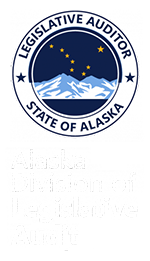| SUMMARY OF: | A Special Report on the Department of Revenue, Alcoholic Beverage Control Board, Sunset Review, November 29, 2002. |
Purpose of the Report
In accordance with Titles 24 and 44 of the Alaska Statutes, we have reviewed the activities of the Alcoholic Beverage Control Board (ABC Board or the board). As required by AS 44.33.050(a), the committee of reference is to consider this report during the legislative oversight process to determine whether the board should be reestablished. Currently, under AS 44.66.010(a)(1), the board will terminate on June 30, 2003 and will have one year from that date to conclude its administrative operations.
- To determine if the termination date of the board should be extended.
- To determine if the board is operating in the public interest. The assessment of the operations and performance of the board was based on AS 44.66.050(c). This statute sets out criteria that are to be used in determining a demonstrated public need for the board.
Report Conclusions
In our opinion, the Alcoholic Beverage Control Board should continue to regulate the manufacture, sale, barter, and possession of alcoholic beverages in Alaska in order to protect the public’s health, safety, and welfare. The board has provided protection to the general public through the issuance, renewal, and temporary suspension of liquor licenses. Protection has also been provided through investigations of suspected licensing violations and enforcement of the state’s alcoholic beverage control laws and regulations.
As indicated in the Analysis of Public Need section of the report, the ABC Board has met the various statutory criteria. With the exceptions noted in the Findings and Recommendations section, the board is effectively and efficiently meeting its statutory responsibilities and is operating in the public interest. The ABC Board is organized under statute as a regulatory and quasi-judicial agency; however, it appears to be spending a disproportionate amount of time and resources on police efforts rather than on the regulatory function. We recommend that Alaska Statute 44.66.010(a)(1) be amended to extend the life of the Alcoholic Beverage Control Board to June 30, 2006. This three-year extension will give the board ample time to correct the deficiencies noted in this report and it will trigger a timely follow-up audit to determine if these deficiencies have been fully addressed.
Findings and Recommendations
- The legislature should consider having the Department of Public Safety conduct criminal investigations, rather than the ABC Board.Title IV was revised in 1999 to have ABC Board staff investigate violations of gambling and prostitution on licensed premises. The Department of Public Safety is better equipped to handle these types of investigations. There would be significant inefficiencies in attempting to turn ABC into a four-officer, statewide police force.
- The ABC Board should seek an amendment to Title IV to allow the board to summarily suspend liquor licenses..Currently the ABC Board does not have the power to summarily suspend a liquor license prior to revocation. Since revocation does not take effect until all due process rights have been exhausted, licensees whose liquor licenses have been revoked may be able to operate for two or more years after the revocation was imposed. Summarily suspending a license involves the immediate cessation of alcohol sales by a licensee while the board pursues revocation of the license. This process provides greater protection to the public while still providing due process rights to the licensee. This power would be similar to that held by other occupational licensing boards and would be used when continued operation by a licensee would pose a clear and immediate danger to the public.
- The ABC Board should conduct routine background checks on all licensees as they renew their licenses or should track licensees through the public safety information system.
- The director should ensure that all fines are collected and deposited into the General Fund.
- The ABC Board and its director should provide goals for the enforcement staff.
- The director should upgrade the ABC Board licensing database.
- The director should require staff to prepare and maintain procedural manuals.
- The ABC Board members should urge the governor’s office to fill board vacancies within the 30-day timeline required by statutes.

